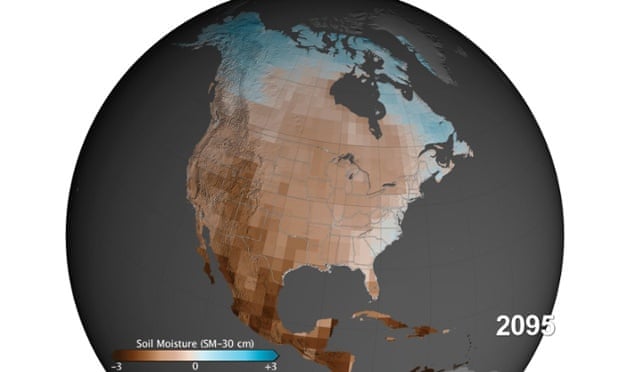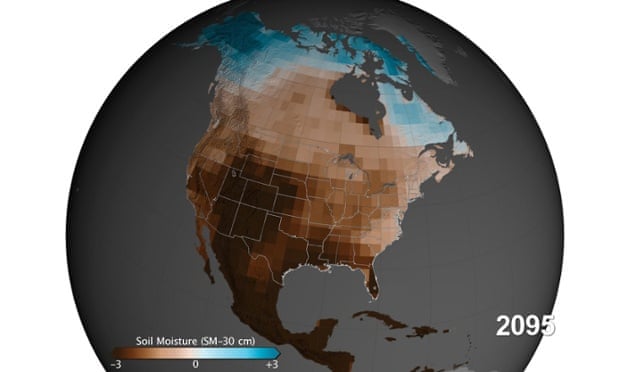NASA climate study warns of unprecedented North American drought
Posted on 16 February 2015 by dana1981
California is in the midst of its worst drought in over 1,200 years, exacerbated by record hot temperatures. A new study led by Benjamin Cook at Nasa GISS examines how drought intensity in North America will change in a hotter world, and finds that things will only get worse.
Global warming intensifies drought in several ways. In increases evaporation from soil and reservoirs. In increases water demand. It makes precipitation fall more as rain and less as snow, which is problematic for regions like California that rely on snowpack melt to refill reservoirs throughout the year. It also makes the snowpack melt earlier in the year. The record heat has intensified the current California drought by about 36%, and the planet will only continue to get hotter.
NASA scientists used tree rings to understand past droughts and climate models incorporating soil moisture data to estimate future drought risk in the 21st century.
The study finds that drought intensity will increase, but could be manageable if we follow a path that involves slowing global warming by cutting carbon pollution.
 Soil moisture 30 cm below ground projected through 2100 for scenario RCP 4.5, which involves action to reduce carbon pollution. Brown is drier and blue is wetter than the 20th century average. Source: NASA’s Goddard Space Flight Center
Soil moisture 30 cm below ground projected through 2100 for scenario RCP 4.5, which involves action to reduce carbon pollution. Brown is drier and blue is wetter than the 20th century average. Source: NASA’s Goddard Space Flight Center
However, decades-long mega-droughts in North America could be much worse than those experienced during medieval times, which led to the decline of native populations, if we continue on our current business-as-usual path.
 Soil moisture 30 cm below ground projected through 2100 for scenario RCP 8.5, which involves business-as-usual high levels of carbon pollution. Brown is drier and blue is wetter than the 20th century average. Source: NASA’s Goddard Space Flight Center
Soil moisture 30 cm below ground projected through 2100 for scenario RCP 8.5, which involves business-as-usual high levels of carbon pollution. Brown is drier and blue is wetter than the 20th century average. Source: NASA’s Goddard Space Flight Center
Jason Smerdon, a co-author and climate scientist at Columbia University’s Lamont-Doherty Earth Observatory, described the implications of the study in stark terms,
The 21st-century projections make the [previous] mega-droughts seem like quaint walks through the garden of Eden
The mega-droughts are projected to hit the main agricultural regions in the United States – both California and the Midwest “breadbasket.” The chronic water shortages that are anticipated in these regions under the business-as-usual scenario would make farming, as well as ranching in the American southwest, nearly impossible.
This study reveals the flaw that underlies the ‘CO2 is plant food’ myth.































 Arguments
Arguments






























The four corners area seems to be ground zero for the deepest levels of drought in any scenario. Interestingly and sadly, ten counties in just that area have just been declaired disaster areas: USDA Declares 10 Western Counties as 'Primary Natural Disaster Areas'
A few things:
[PS] 3. Please stick the science. This is not the place to start of political war.
So, should people be doing anything to prepare for this future?
This goes for coastal settlement as well. Shouldn't we start planning a de-population of some of these areas? Is that to 'political' to talk about?
[PS] "Its too hard" would be a more appropriate thread to talk about solutions. There are other blogs to discuss politics. eg http://thinkprogress.org/climate/issue/
Will@3 you may find the public are not as amenable to change as you might like. Pieces in the MSM such as that in today's Australian by Garth Paltridge a former CSIRO Chief Scientist and Director of the Antarctic Co-oerative Research Centre, which has some very critical comments about Climate Change, may well dissuade many from becoming to concerned about the future climate.
To maintain a more scientific focus I recommend revising the statement "If we follow the business-as-usual path, ..." to more specifically describe the issue. More descriptive alternatives would be:
Fortunately, this statement will become as redundant, tedious and irrelevant as the apparently mandatory "If all the ice in [Antarctica | Greenland] melts". All of that ice is not going to melt for a very long time and we're not going to follow business as usual. We're already not following that trajectory, as both intention and action increase at the political and corporate levels.
The writing on the wall is being read, deniers are becoming dinosaurs walking on ever soggier sands, may their bones make interesting fossils. Joe Public is becoming more sympathetic to the plight of the future even if there's still a lot of resistance to actually doing anything personally. Joe will come round, whether stampeded by Gaia saying "Boo!" or herded by the Powers That Be/Will Be.
Forsooth, we probably won't get to a "below 2°C" but "business as usual" is limping and is going to have to drop out of the race.
Firgoose @6, BAU may be limping, as you say, but that does not mean the course we follow will be towards less CO2 emissions. It is very possible that a dirth of sources of liquid fuels will result in replacement by fuels that emit far more CO2 over the entire production process, per liter of fuel used on the road. That would switch us to a BAU+ path rather than the BAU- path we are currently limping along.
Ben Cook's intimation that the current california drought is a natural cycle event is overstated. His work can only assert this is natural because the regional sea surface temperature anomalies do not show up in the climate models and there is no downward precipitation treand that is statistically significant from the highly variable history data.
It is very likely that the models are simply not adequately addressing regional anthropogenic aerosol patterns, the effects of Hadley expansion in mid-latitudes, the combination with this and arctic amplification effects on the jet stream, shifts in the inter-tropical convergenze zone due to north vs. south hemisphere aerosol loading and (possibly) the effects of deforestation in the south american tropics See: http://www.accuweather.com/en/weather-news/amazon-climate-change/20184965